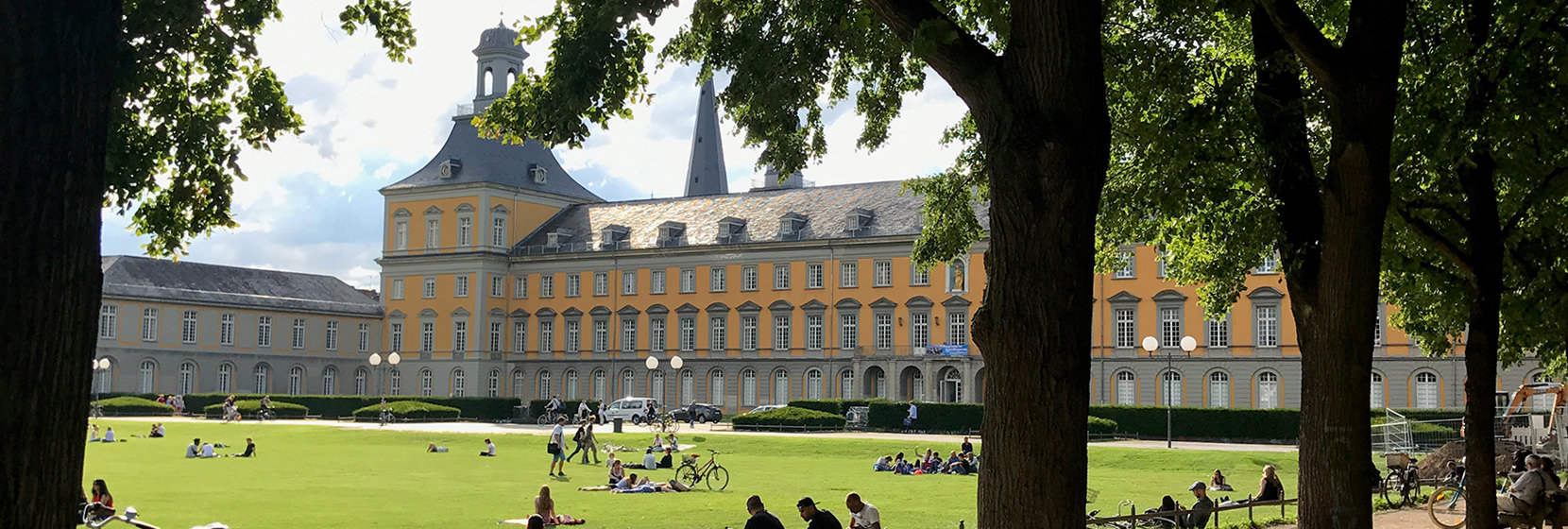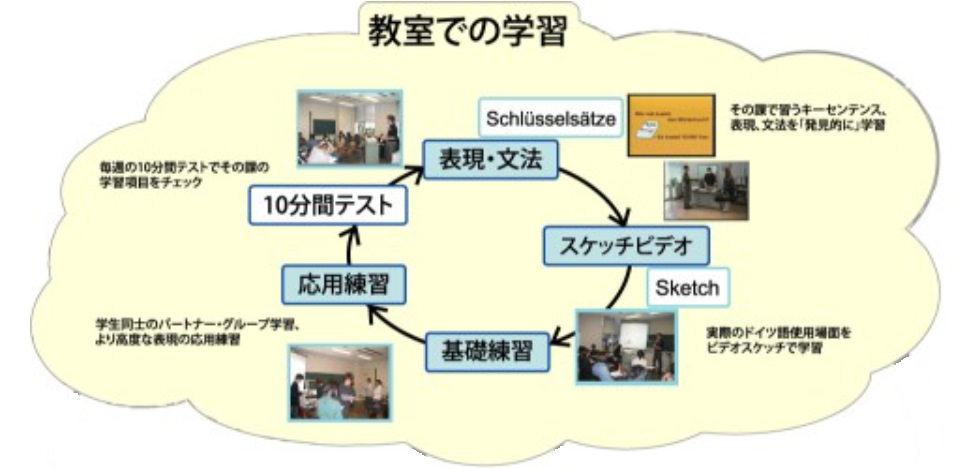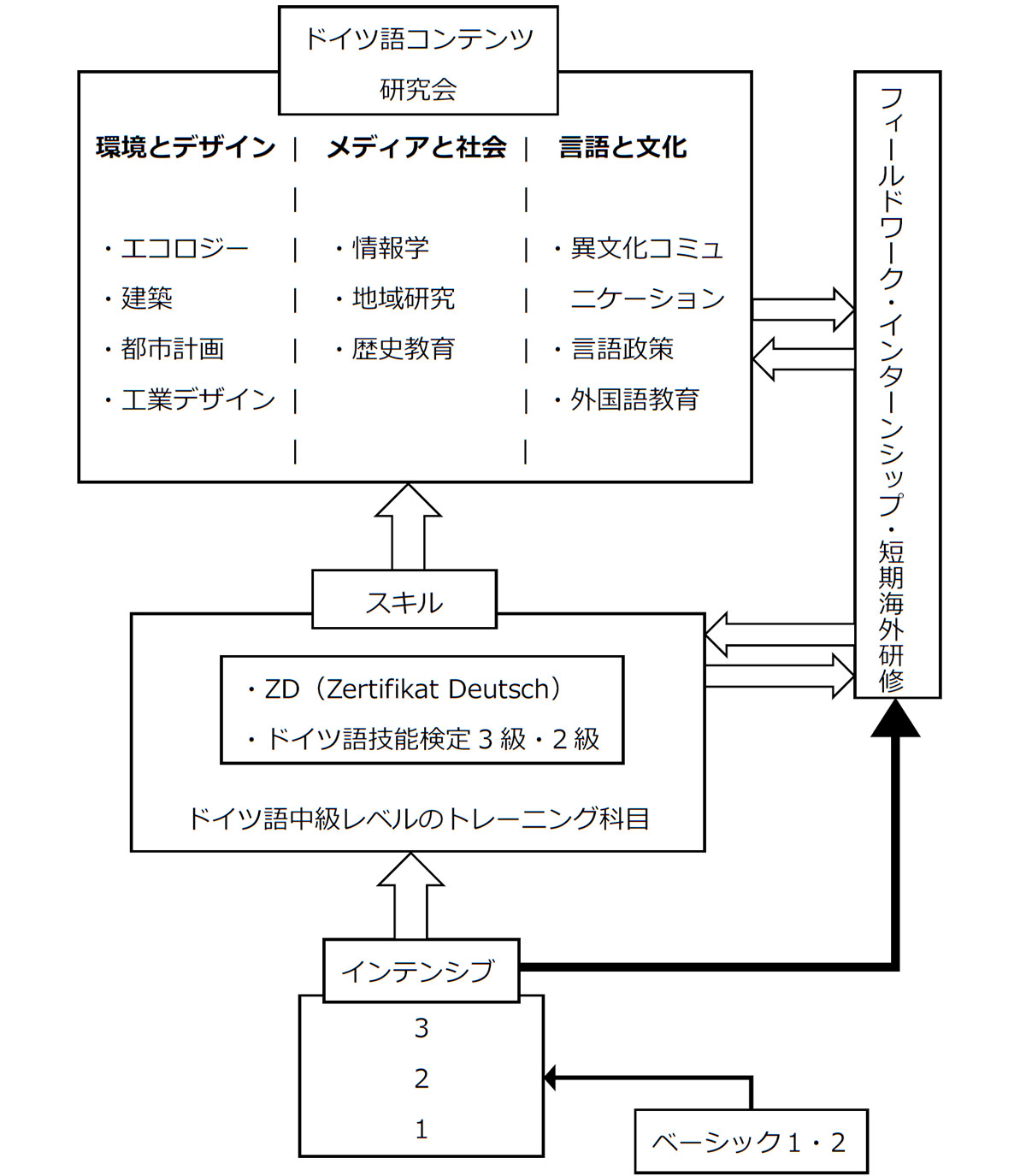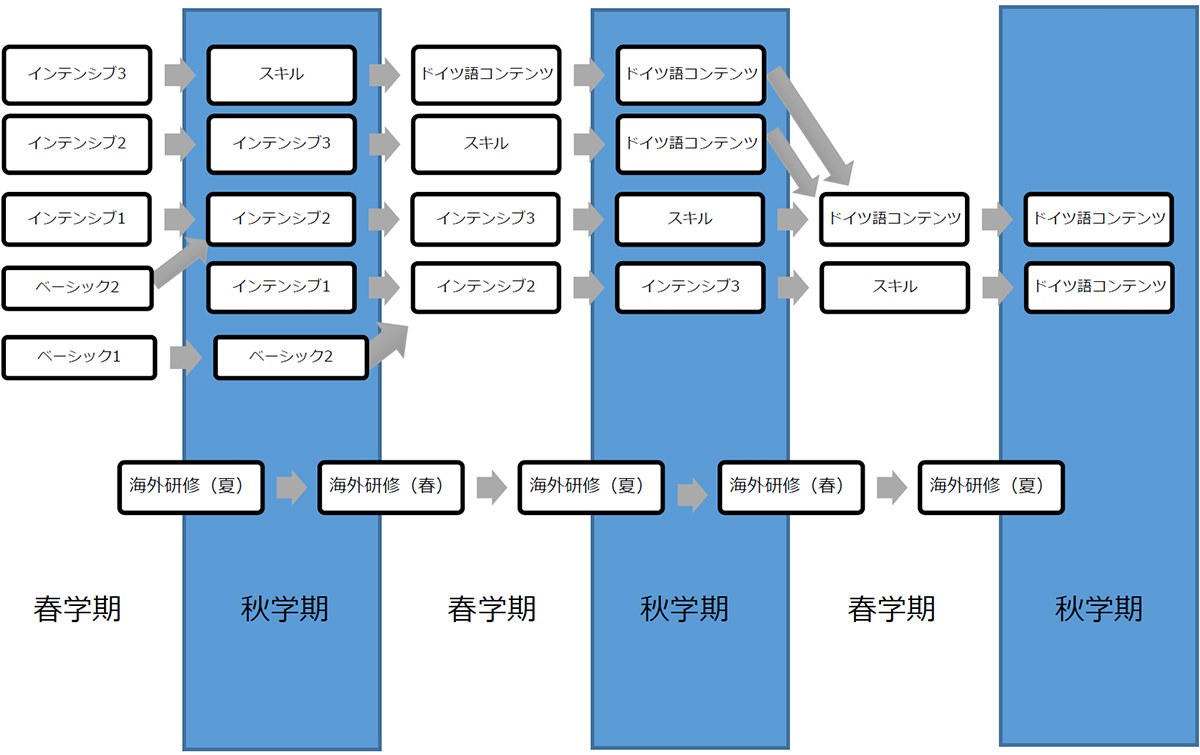
ドイツ語German
はじめに
充実した「Modelle」プログラムでドイツ語を!
ドイツ語圏の「いま」を知る
ドイツ語は、ドイツ・オーストリア・スイス・リヒテンシュタイン・ルクセンブルクなどで公用語として使われ、ヨーロッパでは最大の話者人口を持つ言葉です。ドイツ語圏の国々は、文学、哲学・思想、音楽などの学問や文化で多くの人々を魅了するばかりでなく、都市計画や工業デザイン、環境に対する取り組みや福祉政策、移民・難民問題、情報セキュリティ問題など、現代の生活と密接に関わる分野でも、私たちに大きな示唆を与えてくれます。また、ドイツ語圏はヨーロッパ全体を視野に入れたとき、多言語・多文化社会におけるコミュニケーションに関する研究、政治や経済、歴史や都市づくり等について深く学びたいという人にとっても、ドイツ語は重要な言語スキルです。サッカーやスキーなどに代表される競技スポーツについても、ドイツ発信の情報記事に触れることは多いでしょう。SFCドイツ語研究室は、こうしたドイツ語圏の「いま」にアプローチするドイツ語の教育に力を入れています。
コミュニケーション重視のドイツ語教育
「ドイツ語は難しそう・・・」と思っている人がいるかもしれませんが、それはきっとこれまで皆さんが学んできた外国語の学習形態が文法・講読中心だったからかもしれません。SFCのドイツ語教育は、コミュニケーション主体の、使えるドイツ語の習得を第一の目標としています。特に初級では、SFC生のみなさんにとって重要な<コミュニケーションの場>と<話題>を中心に、短い<キーセンテンス>と<単語>の組み合わせをもとに勉強し、文法はあくまでもその補足として扱います。
SFCドイツ語の授業サイクル―1つの課の流れ―

ドイツ語の基礎を習得するインテンシブおよびベーシックの授業では、ドイツ語研究室の教員がSFC生のために作成した『Modelleモデル・問題発見のドイツ語』という教科書を使用します。これは、ドイツ語研究室でドイツ語教育に携わる教員が長い時間かけて共同で作り上げ、SFCで使用してきた教材を、ビデオ動画教材と本のかたちで出版したものです。多様なデジタル教材も用意されており、PCやタブレット・スマートフォン等のモバイル端末を使って授業時間以外にもドイツ語を学習することができます。
インテンシブ1・2の授業では、「自分について」ドイツ語で発信できる能力をつけること、これが第一の学習目標です。コンテンツの中心であるビデオスケッチでは、SFCに通うみなさんの生活環境を舞台としてドイツ語の世界が展開します。1年間の学習を通じて、自分の生活や考えをドイツ語で表現できる能力を身につけることができます。さらにインテンシブ3では、ビデオスケッチの舞台をドイツ語圏に移し、現地の地域性や文化を取り上げながらドイツ語のコミュニケーションに必要な表現やストラテジーを学びます。授業中にはドイツの複数の大学と結び、ペアワークを共同でおこなっています。
インテンシブ3を修了した後は、スキルやドイツ語コンテンツ科目でドイツ語力をさらにアップさせていくことができます。短期海外研修(春休み・夏休み期間)にもぜひ参加するとよいでしょう。短期海外研修後のさらなるステップアップの機会として、1年間の派遣交換留学や、その他の奨学金による短期フィールドワークのチャンスもあります。こうして、楽しく、かつ充実したプログラムにもとづいて着実にドイツ語の勉強を続けていけば、実際に社会で「使えるドイツ語力」を身につけることができます。
科目ごとの授業内容
1. インテンシブコース
ドイツ語を集中して学習したい人にお勧めの理想的なコース。インテンシブ1~3(通称:G1、G2、G3)の3コースあり、インテンシブ1はまったくの初心者を対象としています。履修の条件はなく、ドイツ語に興味のある人なら大歓迎です。インテンシブ・コースでは、SFCドイツ語研究室が独自に作成した教科書『Modelleモデル・問題発見のドイツ語』とそれに準拠したビデオや音声教材を活用しながら、1課を4回の授業、すなわち1週間で学びます。
SFCではドイツ語で積極的に発信していく能力を重視していますので、古典的な文学作品を読むといったことは、少なくともインテンシブでは行いません。自分がその時点で持っている表現力・語彙力で、できるだけ多くのことを発信し、相手を説得したり合意形成を図ったりするカを習得することに重点を置いています。特にインテンシブ3ではドイツの大学生と定期的にオンラインでの共同授業を行いますので、それまでに学習したドイツ語を実際に使いながらコミュニケーション能力を高める機会が得られます。
インテンシブ3まで修了すれば、あらゆる場面に対応できる言語運用能力が養成され、政治、経済、社会、歴史、文化など、各自の専門分野に関連するテーマについて意見を交換することができるようになります。ドイツ語圏の大学教育機関で開催される短期海外研修に参加するためのドイツ語力も十分身につきます。
2. ベーシック・コース
時間をかけてドイツ語力を習得したい人のためのコース。インテンシブ・コースの授業が週4回であるのに対し、ベーシック・コースの授業は週2回です。他の授業との関係で、週4回ドイツ語の授業に出るのは難しいという人などにおすすめしています。
インテンシブ・コースと同様、SFCドイツ語研究室が独自に作成した教科書『Modelleモデル・問題発見のドイツ語』とそれに準拠したビデオや音声教材を活用しながら、1課を4回の授業、すなわち2週間かけて学びます。つまり、ベーシック1修了がインテンシブ1の前半部分修了、ということになります。ベーシック1を修了すれば、ベーシック2に進むことができます。ベーシック2では、インテンシブ1の後半に相当する部分を学びます。ベーシック2を修了し、さらにドイツ語の勉強を続けたい人は、インテンシブ2へと進むことができます。
3. スキル
ドイツ語の「スキル」、すなわち技能のレベルアップを図るための、インテンシブを発展させた内容の授業で、原則としてインテンシブ3を修了していれば履修することができます*。インテンシブ3のさらに上の力をつけることを目標として、読む・書く・話す・聞くの4つの技能を訓練すると同時に、コミュニケーション能力・ストラテジーの向上を図ります(通称:G4、G5**)。ディスカッションやプレゼンテーションの技術を磨く授業、エッセイを執筆する授業、読解のストラテジーを習得する授業、短期海外研修の準備を行うコースなど、さまざまな授業が用意されています。
* 外国語資格認定試験に合格した人も履修可です。例外として、「海外研修準備コース」はインテンシブ・コースもしくはベーシック・コースと並行して履修できます。
** G4、G5はそれぞれ週に2コマ開講されていますが、2コマセットでの履修を推奨します。また、スキル科目は何度でも履修できますが、G4およびG5については担当教員の許可が必要です。
4. ドイツ語コンテンツ(講義科目)
講義とゼミナールをおりまぜた形式の授業で、直前の学期にスキルを履修していた人、インテンシブを修了した人を対象としています*。ドイツ語「を」学ぶだけでなく、ドイツ語「で」さまざまな対象について議論をしながら考え、学んでいくので、授業は原則としてドイツ語で行います。「メディア論」、「地域論」、「言語論」、「社会論」、「文化論」のほか、ドイツの大学との遠隔授業を行う「日独社会研究」(通称:オンラインゼミナール)という授業があります**。
* 外国語資格認定試験に合格した人も履修可です。
** コンテンツは、「言語コミュニケーション科目」としてだけでなく、「講義科目」(先端科目)としても履修可能です。履修登録時に科目コードを選択してください。
5. 短期海外研修
年に2回、夏休み、春休みの期間にドイツ語圏へ短期留学できます。
ドイツ語圏への短期海外研修は、みんなで一緒に同じ研修地に赴いてコースを受講するのではなく、ドイツ語圏の大学や、IIK、BerlinID、カール・ドゥイスベルク・センターおよびゲーテ・インスティトゥートなどの語学学校といった、さまざまな選択肢の中から各自で研修先を決定し、申し込みをし、単身で赴くという形式をとっています。研修先では、学生寮やユースホステルなどで生活しながら、授業を受講します。したがって、それだけ現地でドイツ語に接する機会も多く、短時間で大きなレベルアップを図ることができます。
海外に初めて一人で行くという人も多いので、そのための準備をスキル科目の中で行っています(「海外研修準備コース」火曜3限)。短期海外研修に行きたいと考えている人はそこでサポートを受けられます。
なお、ドイツ語圏での海外研修は、「ドイツ語海外研修B」(2単位)(もしくは「ドイツ語海外研修A」(4単位))として単位申請もできます*。奨学金の申請もできます。
* スキル科目「海外研修準備コース」を履修し、SFCで認められた授業時間数を満たした研修先を選び、その短期海外研修への参加が会議で認められ、短期海外研修に参加した方は、次の学期に開講予定の「ドイツ語海外研修B」(2単位)(もしくは「ドイツ語海外研修A」(4単位))を履修する資格があります。「ドイツ語海外研修B」(もしくは「ドイツ語海外研修A」)の単位を取得するには、次の学期に入ってから「ドイツ語海外研修B」(もしくは「ドイツ語海外研修A」)の履修登録を行った上で、決められた期日までに以下の3つを提出する必要があります。
- 短期海外研修先が発行した成績証明書ないし参加証明書の写し
- 体験記(ブログ形式)
- フィールドワークについての報告書
5. その他
ドイツ語研究室では、ドイツ語圏の大学と共同で、タンデムも導入しています。ドイツ語を母語とする学生とチームを組み、お互いの学習言語(ドイツ語と日本語)を相互にブラッシュアップします。授業では、インテンシブ・コース3の履修と並行して行うタンデムの他に、短期海外研修や派遣交換留学の準備として導入するタンデム・プラス(Tandem Plus)があります。
また、夏休み、春休みにドイツ語圏でフィールドワークやインターンシップを行うこともできます。海外研修を終えた人に強く勧めます。自分のテーマ(たとえば、環境問題、都市計画、デザインなど)を決めて、そのための研究手段としてフィールドワーク(現地見学、インタビュー、アンケートなど)を行います。
さらに、ドイツ語圏の大学に1年間留学できる派遣交換留学制度もあります。慶應義塾大学は現在、ドイツ・オーストリア・スイス合わせて30以上もの大学と交換留学の提携を結んでおり、これらの大学に留学できます。毎年11月下旬に募集が始まります。大学によっては、奨学金も得ることができます。
ぜひみなさんも、この機会を活かして、ドイツ語を本当に「使える」ようになりませんか。
授業体系図
体系図

履修モデル図

教員スタッフ
専任教員
- 藁谷郁美
Ikumi Waragai - ドイツ語教育、ドイツ文学、外国語学習環境デザイン
- アンドレアス・マイヤー
Andreas Meyer - ドイツ語教育
非常勤教員
マルクス・グラースミュック
Markus Grasmück
ダグマー・クンスト
Dagmar Kunst
ペーター・ホイサーマン
Peter Häußermann
中川 純子
Junko Nakagawa
小笠原 藤子
Fujiko Ogasawara
佐藤 友紀子
Yukiko Sato
ステファン・ブリュックナー
Stefan Brückner
ノイバー・ミヒャエル
Michael Neuber
山田・クロッツ・マティアスダニエル
Daniel Yamada
コーディネートアシスタント(CA)
河端マリアンネ
ドイツ語研究室について
ドイツ語研究室は、λ館4階のλ410にあります。SA(学生アシスタント)が月曜日・火曜日・水曜日・金曜日の1限から4限までの時間帯に常駐しています。TA(ティーチング・アシスタント)やCA(コーディネート・アシスタント)もいます。
ドイツ語の辞書や教科書、外部の試験対策用の問題集なども置いてあります。教員もTA・SAも、履修や学習に関するご相談にはいつでもよろこんで乗りますので、ぜひ気楽にご相談ください。
なお、教員にご相談があるときは、ドイツ語研究室専任スタッフにご連絡ください(doiken [at] sfc.keio.ac.jp)。事前にメールをいただければ、各教員のオフィスアワー以外の時間でも対応可能です。
Introduction
Study German with our full-fledged "Modelle" programs!
Understanding the modern German world
German is the official language in countries including Germany, Austria, Switzerland, Liechtenstein, and Luxembourg, and is the most widely spoken language in Europe. German-speaking countries are well known for academics and cultures including literature, philosophy, and music, but they also inspire us in fields significant to our daily lives such as urban design, industrial design, environmental policies, and issues on immigrants and refugees. In addition, when looking at Europe as a whole, the German language is an important skill for those who wish to further study communication in multilingual and multicultural society, politics, economics, history, urban design, etc. Some may also find it useful when consuming the news from Germany on competitive sports, such as football and skiing. Here at the SFC's German Lab, we are leaning into this approach to German language education by focusing on what is currently happening in the German world.
Communication-oriented German language education
Some may think that German seems difficult to learn. This may be because they have studied foreign languages in grammar- and reading-based approach. We employ communication-focused teaching methods with the aim of teaching students German that they can actually use. Especially in the introductory-level classes, we focus on topics and situations relevant to SFC students. Students learn a combination of key sentences and vocabularies, and grammar as a supplementary tool.
German language course --flow of one lesson--

We use the "Modelle" textbooks for Intensive and Basic courses. The textbooks and video materials were designed with extensive planning and thought put in by the faculty of the SFC German Lab. We also have various online learning materials that can be used outside of class hours with electronic devices such as PCs, tablets, or smartphones.
The main aim of the Intensive 1 and 2 courses is for students to be able to express themselves in German. The video sketches that comprise the core of these courses are designed from the perspective of the everyday lives of SFC students discovering the world of German. After one year of studying German at SFC, students will be able to express their opinions and talk about their daily lives in German. In Intensive 3, the video sketches focusing on the topic of "life in German-speaking countries" allow students to learn about local customs and culture and to further develop expressions and strategies necessary for communication. In the classroom, we collaborate with several universities in Germany, and students engage in pair work with German students.
After completing Intensive 3, students will be able to further improve their German abilities in the Skill and Contents courses. We also encourage students to participate in our short-term study abroad program during spring and summer breaks. For those who completed the short-term study abroad program, we offer more opportunities such as a one-year exchange program or scholarship-funded fieldwork to further develop German skills. At SFC, students get to learn German in a fun, yet fulfilling environment and acquire practical communication skills that they can use in real life.
Course content
1. Intensive Course
Courses for students who wish to study German intensively. There are three Intensive courses: Intensive 1-3 (referred to as G1, G2, and G3). Intensive course 1 is for complete beginners. There are no course requirements, and anyone interested in German language is welcome. Students learn German four times a week, which covers one lesson using our original learning materials including the "Modelle" textbooks, the accompanying videos, and audio materials. At SFC, we put an emphasis on actively using German, so we do not study classic literature in the Intensive course. The emphasis is on learning to communicate as much as possible with the expression and vocabulary one has at the time, and to acquire the skills to persuade others and build consensus. In Intensive 3, in particular, we have online joint classes regularly with university students in Germany, which give SFC students the opportunity to grow communication skills while using German they have learned.
After completing Intensive 3, students will be able to talk about various situations and topics and express their own opinions relating to their fields of interest, such as politics, economics, society, history, and culture. They will also have sufficient German language skills to participate in the short-term study abroad program held at universities or educational institutions in German-speaking countries.
2. Basic Course
This course is designed for students who want to learn German at a slower pace. The Basic course class meets twice a week, whereas the Intensive course class meets four times a week. We recommend this course to those who don't have the time to dedicate four class periods per week to learning German.
In the Basic course, students use the same "Modelle" textbooks as well as the accompanying video and audio materials as in the Intensive course. Students study one lesson divided into four class periods over two weeks. Therefore, by the end of Basic 1, students will have completed the first half of Intensive 1. After completing Basic 1, they will be able to move onto Basic 2. In Basic 2, students will go over the second half of Intensive 1. After completing Basic 2, they can continue learning German by taking Intensive 2.
3. Skill
The Skill course is designed to develop various German skills, and are an extension of the Intensive course. Students can take the course after completing Intensive 3.* This course aims to further develop reading, writing, speaking, and listening skills, and to improve communication skills and strategy (G4, G5**). Course contents include: class focusing on improvement of discussion and presentation skills; essay class; reading comprehension class; preparation class for study abroad courses.
*Students who passed the foreign language placement test may also take this course. The exception is "Preparation course for the short-term study abroad course" which may be taken concurrently with the Intensive or Basic course. **G4 and G5 offer two classes per week respectively. It is recommended that students take both classes as a set. The Skill course can be taken multiple times, but the lecturer's permission is required to retake G4 and G5 classes.
4. Contents (Lecture Course)
The Contents course is a combination of lectures and seminars, and is designed for students who have completed the Intensive course or taken the Skill course in the previous semester.* In these courses students are able to not only learn German, but also about various topics while having discussions in German. The classes are fully taught in German. Some examples of classes are: Media and Society, Regional Studies, Theory of Languages, Social Studies, Cultural Studies, and Society in Japan and Germany (Online Seminar), in which students work with German university students via video call.**
*Students who have passed the language placement test may also take these courses.
**Contents course can either be taken as "Language Communication Courses" or as "Lecture Courses" (Advanced Subjects). Select the appropriate subject code number when registering for the course.
5. Short-Term Study Abroad Courses
Short-term study abroad opportunities in German-speaking countries are offered twice a year during summer and spring breaks.
In the short-term study abroad course, rather than everyone going to the same location and studying in the same course, students select a host institution from a variety of choices including universities in German-speaking countries such as IIK, BerlinID, Carl Duisberg Center, and the Goethe Institute. Students submit an application, and then travel to the host institution by themselves. They take classes at the host institution while staying at a student dormitory or a youth hostel. Students are able to immerse themselves in the German language while abroad, allowing them to make leaps and bounds in their language abilities in a short period of time.
Since many will be going abroad alone for the first time, we offer a preparation class in the Skill course (Study Abroad Preparation Course in the 3rd period, Tuesday). Students who are planning on participating in the short-term study abroad program are able to receive support in this class.
Note that those who participate in these programs abroad can apply to receive credits for the courses "Study Abroad B" (2 credits) or "Study Abroad A" (4 credits).* Scholarships are also available.
*Students who participated in the study abroad program are eligible to register for "Study Abroad B" (2 credits) or "Study Abroad A" (4 credits) in the semester immediately after participating the program. To register for these courses, you are required to complete the followings before participating in the program: completing the "Study Abroad Preparation Course" in the Skill course, selecting a host institution that fulfills class hours stipulated by SFC, and receiving approval for participation in the study abroad program by the Committee Meeting. In order to acquire credits for "Study Abroad B" (or "Study Abroad A"), you are required to register for "Study Abroad B" (or "Study Abroad A") in the following semester and to submit the following three documents by the prescribed date.
- - A copy of the transcript of academic record or certificate of participation issued by the host institution
- - Study abroad diary (blog format)
- - Report on fieldwork
6. Other
The German Lab is implementing a tandem learning system in collaboration with universities in the German world. Under the system, students on both sides are able to develop their language skills (German or Japanese) by working in tandem with students who speak the other language natively. In addition to tandem learning offered in Intensive 3, Tandem Plus is offered as a preparation for short-term study abroad programs or student exchange programs.
Fieldwork and internship opportunities in the German world are also available over summer and spring breaks. We strongly recommend it for those who have completed the study abroad program. In these programs, students conduct fieldwork such as on-site observation, interviews, and surveys to research a topic of their choice (e.g. environmental issues, urban planning, or design).
Students can also study at a university in the German world for one year through the student exchange program. Keio University currently has student exchange partnerships with over 30 universities in Germany, Austria, and Switzerland at which students can study abroad. Applications open in late November every year. Some universities offer scholarship as well.
We encourage each student to take the advantage of these opportunities and achieve real fluency in German.
Class System Diagram
体系図

Course Registration Planning Model

Faculty members
Full-time faculty members
- Ikumi Waragai
Ikumi Waragai - German language education, German literature, foreign language learning environment design
- Andreas Meyer
Andreas Meyer - German language education
Part-time lecturers
Markus Grasmück
Markus Grasmück
Dagmar Kunst
Dagmar Kunst
Peter Häußermann
Peter Häußermann
Junko Nakagawa
Junko Nakagawa
Fujiko Ogasawara
Fujiko Ogasawara
Yukiko Sato
Yukiko Sato
Stefan Brückner
Stefan Brückner
Michael Neuber
Michael Neuber
Daniel Yamada
Daniel Yamada
コーディネートアシスタント(CA)
Marianne Kawabata
German Lab
The German Lab is located on the fourth floor of the Lambda Building (λ410). The Student Assistants (SA) are available in the lab from 1st to 4th periods Monday, Tuesday, Wednesday, and Friday. There are also Teaching Assistants (TA) and Coordinating Assistants (CA).
German dictionaries, textbooks, and workbooks to prepare for exams held by external organizations are also available. Lecturers as well as TAs and SAs are happy to help you with your coursework and studies, so do not hesitate to consult us.
If you would like to consult with a lecturer, please contact the full-time staff in the German Lab at doiken[at]sfc.keio.ac.jp If you send us an email in advance, we can accommodate you outside of office hours.